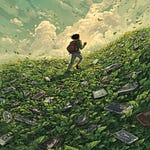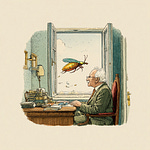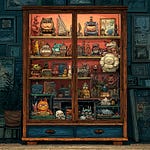“If you would wish for one thing for your child,” wrote the late, great behavioral economist Daniel Kahneman, “consider wishing they are born optimists.”
One of my favorite drums to flog in this space is the need for sunny dispositions. It isn’t just that people who have optimistic outlooks tend to lead better lives and are overrepresented in leadership and entrepreneurial circles. More importantly, optimism’s opposite - cynicism - enjoys a covert status in intellectual and social circles it neither warrants or helps. This isn’t to say it isn’t understandable. Kahneman’s body of intellectual work comprehensively proved the evolutionary advantage that cynicism has over optimism, so substantial that human beings value mitigating loss over gains at a 2:1 ratio. In other words, you will roughly prefer to avoid losing $50 than gaining $100. Weird.
It is a powerful thing to be optimistic, for a smorgasbord of reasons. Believing that you can do something, that things will work out in the end is a kind of existential superpower, a secret that the religious exploit with the ultimate optimistic backstop, heaven. It is also, as Kahneman intimates, partly genetic, which is another reason people write optimism off. It is mighty unfair for me to trumpet an attitude apparently unavailable for a large (and apparently growing) sections of the population - you are the way you are. By the way, we have a term for people like you Hoysted - toxic positivity.
It’s true; I’m somewhat of an optimist. Born that way. Light follows me wherever I go, and each morning I shit rainbows. But in the interests of poking a stick in the wheels of a circular mode of thought - the world is a bad place because I was born that way, and I was born into a bad place - let me also suggest that habits of mind are eminently trainable. The evidence of this is so abundant I scarcely need to rattle it off, but a brief list includes the science of neuroplasticity, cognitive behavioral therapy, meditation, the general process of education and, of course, the fact that you are no longer a tantrum-throwing child show that our brains and - more importantly - our thoughts are not destiny.
We know, for example, that emotions, far from being concrete signals about the reality outside, are as interpretable as abstract expressionism. Their messages are entirely maleable, often mediated by pressures invisible to our consciousness. In one experiment, researchers Stanley Schachter and Jerome Singer gave participants a shot of an unnamed substance (epinephrine, or synthetic adrenaline). They told some participants that heart palpitations could be a side-effect, others nothing at all, and sent them into a room with one of two actors. One of the actors would behave angrily, and the other happy. Afterwards - you guessed it - participants with the angry actor felt angry, those with the happy actor euphoric, and those who were told of the side effects nothing at all.
The absolute uncertainty about what our thoughts and emotions actually mean is an ancient truth, managed in some form by virtually all religions, and often obscured by the informational forces abounding today. But between feelings of hopelessness, nihilism and relentless cynicism there is a choice. Let’s take a gander at what this choice is, as well as what optimism is not, and - perhaps - why sunny dispositions are kind of urgent today.
Optimism is Good For Us All
Optimism operates at a larger scale than simply waking up and looking out the window at a sunny day. We have measures of optimism, in the form of interest rates, forecasts and new businesses. Every new endeavor, each institution built by humans is a vote for the future. Take interest rates; obstensibly a measure of risk for banks and their overnight deposits with the central banks, they are of course used to forecast all sorts of risk in mortgages, business loans and bonds. The lower the risk the more optimistic you could say the central bank is (although they would talk about monetary flows and employment). When interest rates are low, the champagne and cocaine tends to break out, people take on cheap debt, and the capital flows merrily through the system. When they rise, you get what we have now - a pervasive sense of ambiguity.
Of course, what comes up must come down. Economic growth does grow linearly, but in spurts of optimism followed by necessary bouts of pessimism. Over the long term, societies that can collectively harness our cheer, the idea that things could be better by building better things, seem to do slightly better. I’m not just talking about economic growth, either - every movement that matters, from suffragettes to civil rights to the creation of a benevolent state in the first place, has to start from the place that things could be better. And you go from there.
By contrast, societies that are relentlessly cynical have to rely on zero-sum games, an ‘other’ that must be defeated to prove one’s might, rather than a frontier to conquer together. Some countries - and I’ll let you decide which they are - operate on such games, inventing more and more enemies to keep the dance going. Optimistic societies, on the other hand, want to build more things, for more people. Cynical societies need to dominate others to survive.
What Optimism is Not
We secretly admire cynics. This isn’t just me. Rating a series of reviews about a play or movie, research participants will reliably prefer the negative ones, because they come across as more intellectually serious. You didn’t need me to tell you that - anyone who’s spent three seconds on search engine optimisation knows that you need to bundle words with strong emotional connotations - especially if they’re negative. News outlets are basically forced to use this cynical tactic and get people mad enough to read their articles. I use them for the titles of my blogs. I used them for this one (I swear, I am an optimist).
Evolutionary biologists and economists alike seem to agree that negativity bias stems from the savannah, where the forager who heard a rustle in the bush and ran without a second thought could save themselves. The optimist was tiger food. In fact, life’s risk often take highly asymmetrical proportions like this - the big chance that the risk turns out to be nothing is vastly outweighed by the small one that costs everything. Survival rewards the cautious. In the beginning, maybe cynics probably got to mate a lot more than optimists. Maybe we’re descendants of dyed-in-the-wool sad sacks.
It isn’t just about wanting to avoid the bad. Optimists are dangerous. Kahneman’s research - quoted above - also showed that optimists dominate volatile industries and adorn the boardrooms of high flying companies. The Global Financial Crisis was almost certainly caused by the exuberance of high finance. Economists like Joseph Strumpeter and John Maynard Keynes observed the cyclical nature of markets, driven in part by optimistic market participants rushing headlong into Tulip Manias. Everyone pays a price when optimism turns to greed. Does anyone really want the captain of a ship wearing their cap at a rakish angle and grinning like a maniac when they set off on the high seas? Give me a stiff any day, a blue collar type who checks the mainsails once more than necessary. When much is at stake, it pays to be careful, even cynical.
And yet. And yet, optimism isn’t optional if you believe in growth, personal or societal. You wouldn’t do anything if you didn’t think there might be a chance you couldn’t achieve it; every achievement you’ve ever got started with a modicum of optimism, a glimmer that the task could be done. Anyone who’s suffered depression knows how it seems to drape over the entirety of existence like a black cape, a vampire that clouds the future and stands on one’s chest like a noonday demon. Let us return to that choice, the one between what we feel, and how we act.
What Optimism is, and Why We Need It
Between malignant beliefs like domination or nihilism, and the ignorant cheeriness of toxic positivity, lies the sort of optimism I’m trying to promote. We need it. News outlets and their shitty headlines only go so far. I think the Democrats got booted out of office in large part because they struggle to articulate an optimistic future; all those sayings about whichever political party seems to be having the most fun do best might actually just be saying this truth. In a world abundant with information, we’ve all seen the emperor with no clothes on; no institution, no politician, no-one can be taken that seriously because nowdays we know what goes on behind closed doors. The reaction to the murder of Brian Thompson was the tip of this iceberg; ranging between admiration of Mangione and ambivalence toward Thompson, it revealed the deep cynicism about institutions and those that run them that we would wonder if random murder was justified.
This isn’t tenable. It’s the same, zero-sum game that drives people to where we are now - settling for half-truths and dunking on our political opponents, rather than a radical curiosity in trying to understand things as they actually are. We don’t live in a utopia, but we don’t live in hell, either; the truth is somewhere in between, and optimism is about wanting to find it. We want to find out what the truth is so that we can actually do something about it. Cynicism, on the other hand, doesn’t care what the truth is. It seeks to serve its own ends, to satisfy its already-certain belief that things are bad and always will be. A sure sign of a cynic is that when something bad happens, they aren’t surprised.
It goes double for your personal life. Optimism isn’t about smothering the bad and pretending everything is OK - we face what is truly happening in our lives, and seek to understand it. Kahneman wasn’t just saying that optimists have better lives. Optimists suffer just as much as anyone else, but what they do with that suffering is integrated into a story that is meaningful and turned toward growth. I don’t need to spout off on growth mindsets - the story we tell ourselves is everything. Optimists don’t lead happy lives, in the cheap, modern sense of enjoying a string of pleasures. They lead rich ones, following the invitation to depth, lead by a story that feels powerful and true.
Because that’s all that’s between your emotions and how you reflect on your life; a story. That was another thing Kahneman discovered - we have experiencing selves, and we have remembered selves. In many ways, it doesn’t really matter what happens to the experiencing self. It will have many ups and downs, just like society. But the remembered self - the remembered self is pure, 100% story, a confection of what we did and what we did about it, stretching back to our first memories. Optimists take this story and refuse to be shaken by the experiencing self.
They take the wreckage, and they build something generative with it. They make that decision.
















